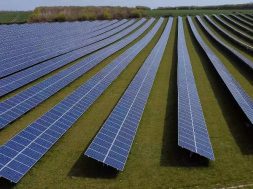
After WTO shock, Centre set to subsidise home, foreign solar power projects
After losing a case to the US at the World Trade Organization for favouring local manufacturers in its solar power programme, India is finalising a scheme to subsidise both domestic and foreign companies that will manufacture in the country, without running contrary to the WTO rules.The ministry of new and renewable energy (MNRE) has prepared a draft Cabinet note of the scheme for inter-ministerial consultation. “We have decided to support domestic manufacturing through direct subsidy in the form of either interest subvention or cheaper land bank to be made available to companies that want to make in India,” Santosh Vaidya, joint secretary at the MNRE, told FE.
The draft scheme will be placed before the Cabinet for approval after the consultation process gets over. Once approved, companies like US-based FirstSolar or China’s Trina Solar will be able to reap the same benefits as any domestic company.The draft scheme will be examined by the commerce ministry to see if it complies with the WTO norms, said a senior official. “While we intend to comply with the WTO ruling, we will vigorously pursue our case against the violation of WTO provisions by certain US states in their own solar programmes,” he added.
In a bid to promote local manufacturing, the government had mandated that a certain portion of capacity addition be reserved for domestically sourced modules under the national solar mission. The companies that use such modules are eligible for participating in the tariff-based bidding process.In 2013, the US filed a complaint before the WTO, arguing that the domestic content requirement imposed under India’s solar programme violates global trading rules by unfavourably discriminating against imported solar cells and modules. In February this year, a WTO panel ruled that by imposing the domestic content requirement India had violated its national treatment obligation. Earlier this month, India lost an appeal at the WTO against the February ruling. Since the appeal ruling is final, India is now supposed to bring domestic laws into compliance with the WTO norms.
US solar exports to India have fallen by more than 90% since India brought in the rules, the US is learnt to have claimed.The US move prompted India to point at violations of some of the WTO provisions by the US in the latter’s own renewable energy sector. Accordingly, India this month filed a complaint against the US at the WTO, arguing the states of Washington, California, Montana, Massachusetts, Connecticut, Michigan, Delaware and Minnesota support their renewables sector with illegal subsidies and domestic content requirements.
Analysts have said the attraction of India being a lucrative market for global solar power players is at the heart of the trade disputes between the two countries. India aims to sharply raise its solar power capacity to 100 gigawatt (GW) by 2022 from just 8.1 GW as of June this year.The country currently has an operational cell manufacturing capacity of only about 600 megawatt (MW), but a pipeline of around 1,800 MW of domestic content requirement (DCR) projects has already been built, Bridge to India, a renewable consultancy firm said in its report.However, despite the proposed incentives, domestic manufacturers will have a tough task ahead competing, as the supply glut from Chinese manufacturers have driven down prices drastically in the last few months.
















